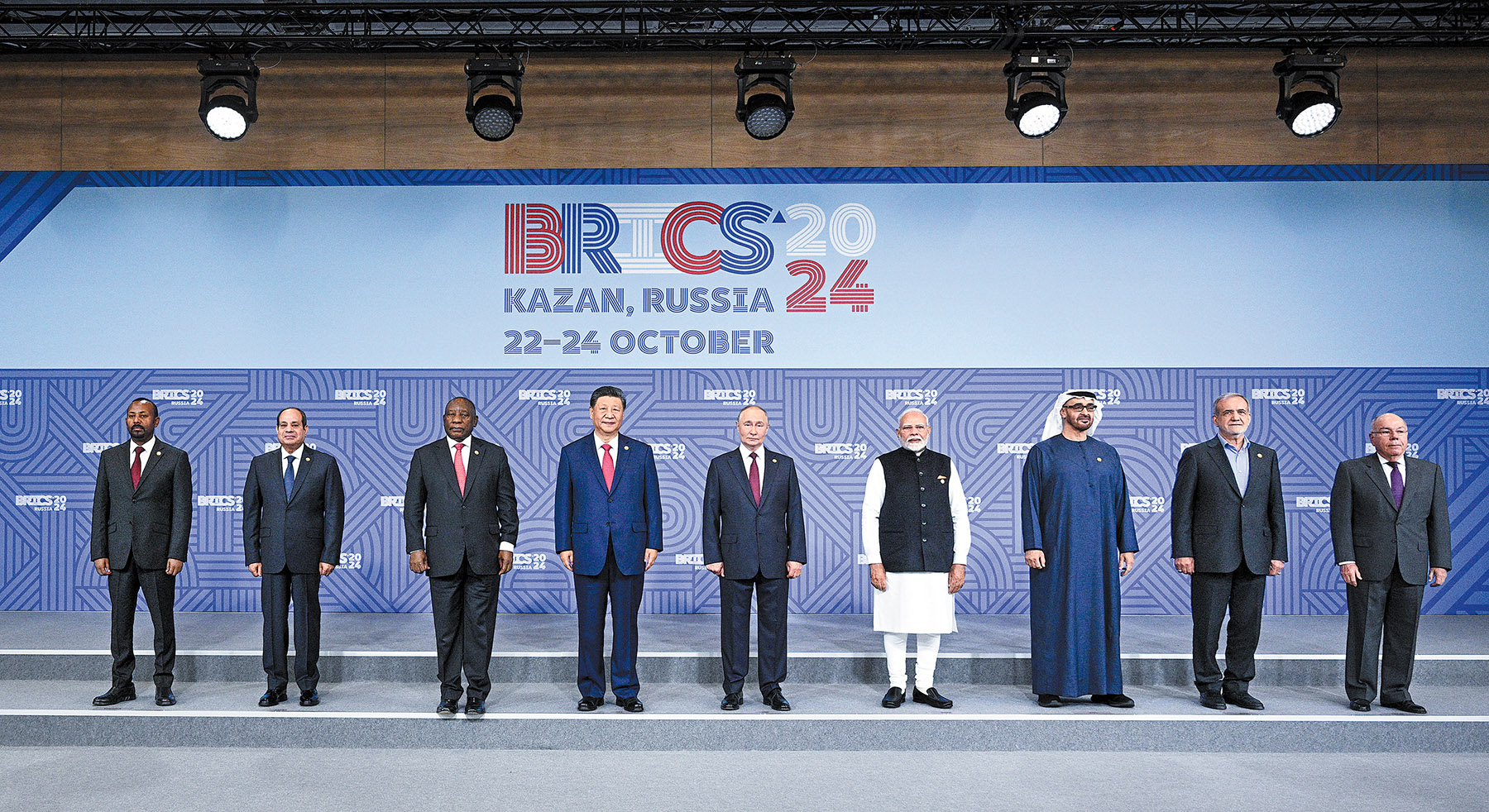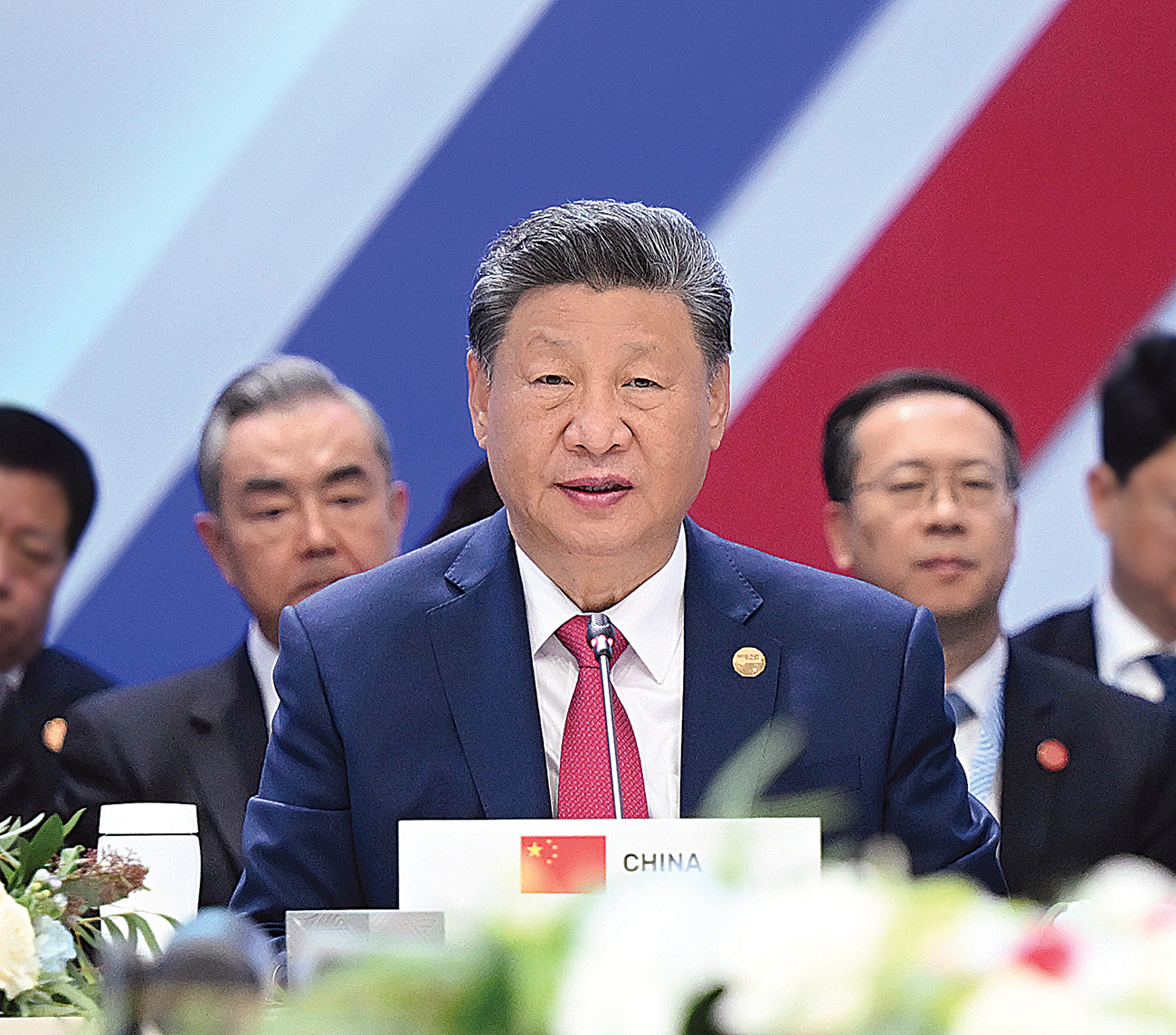Xi announces fresh plans to boost BRICS nations’ high-quality development in innovation, science, economy

At the 16th BRICS Summit in Kazan, Russia, on Oct 23, President Xi Jinping called on member countries to jointly build the expanded grouping into “a primary channel for strengthening solidarity and cooperation among Global South nations and a vanguard for advancing global governance reform”.
In a speech at the summit, Xi proposed building a BRICS committed to five major aspects — peace, innovation, green development, justice, and closer people-to-people exchanges.
On behalf of China, Xi announced a series of fresh plans and measures to boost BRICS nations’ high-quality development in areas such as innovation, science, economy, industry, and eco-friendly sectors.
“China will establish a BRICS Deep-Sea Resources International Research Center, a China Center for Cooperation on Development of Special Economic Zones in BRICS countries, a China Center for BRICS Industrial Competencies, and a BRICS Digital Ecosystem Cooperation Network,” Xi said.
He noted that BRICS countries must keep pace with the times and foster new quality productive forces, as the latest round of technological revolution and industrial transformation is advancing at an accelerated speed.
Beijing is ready to “deepen cooperation on innovation with all BRICS countries to unleash the dividends of AI development”, he said.
Also, China “is willing to leverage its strengths to expand cooperation with BRICS countries in green industries, clean energy, and green mining, and promote green development through the entire industrial chain”, he added.
When it comes to people-to-people exchanges, mutual learning among different cultures, and education, Xi announced that China will implement a capacity-building program for BRICS digital education.
“We will open 10 learning centers in BRICS countries in the next five years and provide training opportunities for 1,000 local education administrators, teachers, and students,” he said.
He underlined the need to promote the spirit of inclusiveness and harmonious coexistence among civilizations and “fully harness the untapped potential for cooperation in areas such as education, sports, and the arts”.
Observers said the fresh proposals made by Xi at the summit will lead to tangible steps to empower BRICS cooperation, catalyze innovation-driven growth, and boost mutual understanding among Global South countries.

In the first three quarters of this year, China’s imports and exports with other BRICS member countries totaled 4.62 trillion yuan ($650.6 billion), a year-on-year increase of 5.1 percent, according to China’s General Administration of Customs.
“The cooperation among the BRICS countries is a very important impetus for driving the next generation of globalization,” said Zhou Mi, deputy director of the Institute of American and Oceania Study at the Ministry of Commerce’s Academy of International Trade and Economic Cooperation.
“Cooperation among the BRICS countries should not be following just one single pattern. They can try to find best practices, and the best practices can be learned and borrowed by others,” he said.
Vasiliy Pushkov, director of the Directorate of International Cooperation of the International Information Agency and Radio Sputnik, said that the BRICS mechanism represents multipolarity, as well as diverse interests and civilizations.
BRICS countries should continue to strengthen their solidarity and cooperation, enhance mutual understanding and dialogue among civilizations, and continue to amplify the voice of most people on this planet, Pushkov told Xinhua News Agency.
On Oct 22, Xi called for building a BRICS for justice and leading the reform of the global governance system. He called on BRICS members to conform to the general trend of the rise of the Global South and actively respond to the call of countries to join the BRICS cooperation mechanism.
“We must ensure that global governance reform is guided by the principles of fairness, justice, openness, and inclusiveness,” he said, noting that it is necessary to enhance the representation and voice of developing nations in global governance.
After the recent historic expansion of the grouping, BRICS countries’ share of global trade has exceeded 20 percent.
“In light of the rise of the Global South, we should respond favorably to the calls from various countries to join BRICS,” Xi said when urging advancing the process of expanding BRICS membership and establishing a partner country mechanism.
When highlighting the pressing need to reform the international financial architecture, Xi said, “BRICS countries should play a leading role in the reform.”
“We should deepen fiscal and financial cooperation, promote the connectivity of our financial infrastructure, and apply high standards of financial security,” he said.
The New Development Bank, set up by BRICS and headquartered in Shanghai, has delivered impressive outcomes since its founding nine years ago and has cumulatively approved loans of $35 billion for more than 100 projects.
At the summit, Xi said the New Development Bank “should be expanded and strengthened”.
“We must ensure that the international financial system more effectively reflects the changes in the global economic landscape,” he said.

Observers said the fact that over 30 countries and international organizations took part in the BRICS summit this year illustrates the BRICS cooperation mechanism’s unlimited inclusiveness and openness, as well as its popularity in the global community.
“One of the most remarkable changes that has taken place over the past 18 years is that the constant development of the BRICS cooperation mechanism has spurred and driven a number of developing countries to rapidly grow economically and socially,” said Wang Wen, executive dean of Renmin University of China’s Chongyang Institute for Financial Studies.
BRICS has also effectively encouraged developing countries to become better involved in the globalization trend, leading to substantial progress and changes taking place in the world landscape in the political and economic context, he said.
“As a major mechanism for gathering leaders of emerging economies and developing countries, BRICS will further facilitate the reforms of the world order,” he added.
Xu Xiujun, director of the International Political Economy Department of the Chinese Academy of Social Sciences’ Institute of World Economics and Politics, noted that since its founding, BRICS “has been committed to the interests of the Global South, which has been one of the key sources of its legitimacy”.
The rise of the Global South requires both a greater voice of its countries in the international community and the Global South having greater capability to shoulder more international obligations and responsibilities, he said.
On Oct 23, Xi also called on BRICS member states to “act as defenders of common security” to boost global peace. Only by embracing the vision of common, comprehensive, cooperative, and sustainable security can we pave the way for universal security, he said.
Speaking on the lingering Ukraine crisis, Xi noted that China and Brazil, in collaboration with other countries from the Global South, initiated the Friends for Peace group to address the crisis.
“We must uphold the three key principles: no expansion of the battlefields, no escalation of hostilities, and no fanning flames, and strive for swift de-escalation of the situation,” he said.
Noting the humanitarian situation in Gaza and the flames of war rekindled in Lebanon, Xi called on nations to “promote an immediate cease-fire and an end to the killing”.
“We must make unremitting efforts toward a comprehensive, just and lasting resolution of the Palestinian question,” he said.


